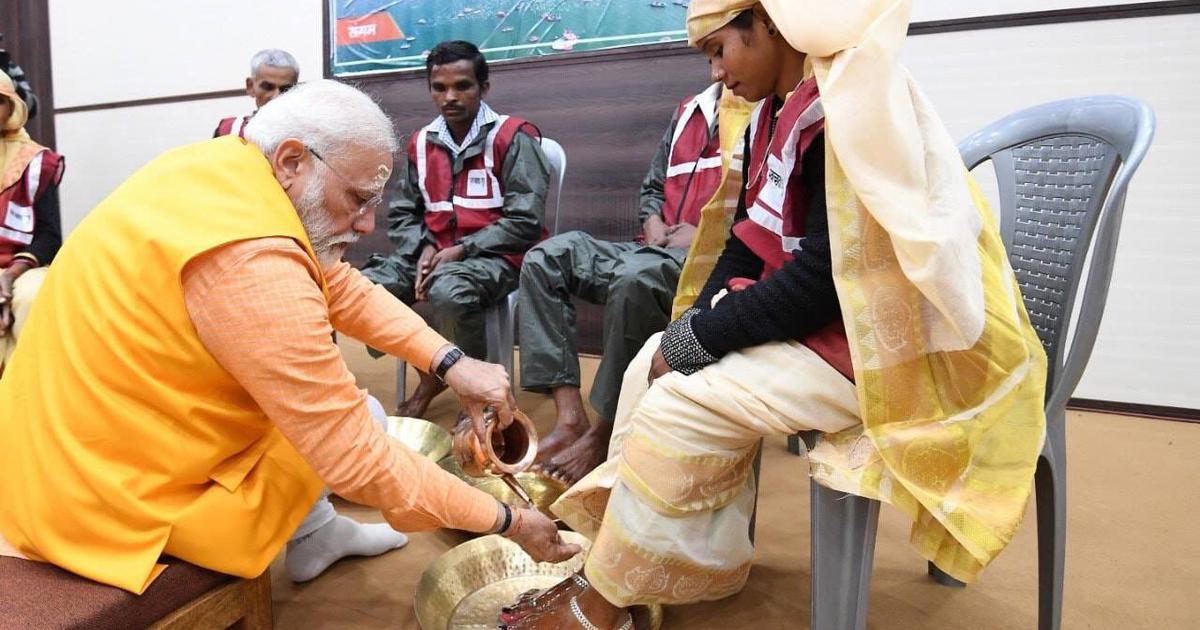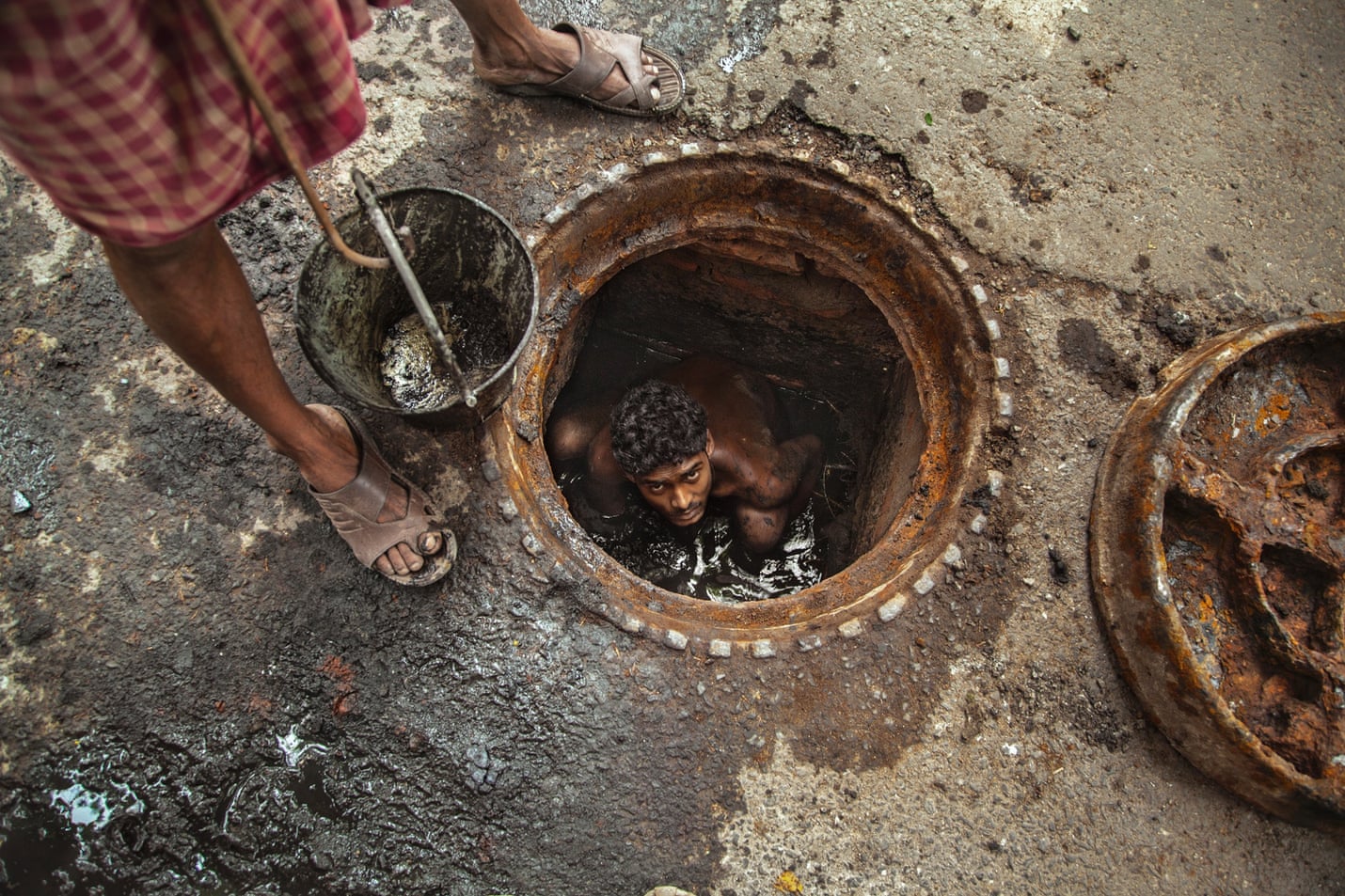Amidst the politics of rhetoric and theatrics, a more organised approach is required to deal with the problems of India’s sanitation workers.
The New Leam Staff

Prime Minister Narendra Modi performed a very symbolically significant act- he washed the feet of five sanitation workers in Prayagraj. The videos that have been released of the prime minister’s recent visit to the Kumb Mela and his act of washing the feet of five sanitation workers there, has captured the nation’s imagination. While what cannot be denied is that the prime minister had managed to attract a wide range of media attention by performing the feet-washing ceremony, it also managed to raise questions about the structural changes that have been introduced to empower sanitation workers. The way the prime minster carried himself in the Kumb Mela appeared as if it was carefully crafted to leave a message that here is a leader who knows and respects the tradition and culture of India.
From his obeisance to river Ganga through the performance of the Ganga Aarti and the Ganga Snan which was full of the chanting of Vedic mantras to the washing of the feet of those at the margins- the media flooded with the images of a man who seemed to acknowledge the ‘rich cultural and symbolic aesthetics’ that India was so proud of. While the first two actions were in agreement with the ritualism and traditions of the Hindu civilization, the third carried a much more symbolically enriched meaning that ought to be discussed. The prime minster sat on a stool lower to the chairs of the sanitation workers and washed their feet while he was being captured by the keen camera. The group of sanitation workers also had something important to tell- it composed of two men and three women workers.
In a nation where women die in patriarchal constraints, are killed for marrying a man outside their religion or caste, are denied the empowerment to pursue their careers and the skewed sex ratio justified the inequality- the prime minister challenged the status quo by washing their feet. After the prime minister washed their feet, he went on to address a larger audience. He talked about how the sanitation workers worked hard to keep the Kumbh township clean but never talked about improving their disgusting working conditions or of introducing new technologies to improve their condition. There were no policy announcements for the sanitation workers and nothing that meant that from now on their lives would improve. Where are the sanitation workers supposed to go? Is there any promise of renewed life after the prime minister’s symbolic feet-washing gesture?
Bezwada Wilson who spearheads the Safai Karamchari Andolan in India once said that the struggle of a sanitation worker is beyond wages, pensions, PF and sick leaves; their struggle is about the human right to live with dignity. Sanitation work or cleaning jobs is not just a job in India it is rather a state of being. One does not voluntarily opt for the job but it is considered that one is destined to be a part of that category (sanitation worker) by the virtue of being born into a particular caste category.
Even in the 21st century there are still some occupations in India which follow the caste based division of labour for recruitment rather than skills, education or formal training. As written down in the most controversial book of the times- Manusmiriti, people belonged to different caste categories and these categories are hierarchical in nature. Based on the caste to which the individual is born into is his occupation and nobody is allowed to cross cut and opt for occupation higher or lower than the one to which they are entitled. Narendra Modi mentioned that his act (cleaning their feet) was an act of worship but are they (sanitation workers) really worshiped in the society as well or least to expect- are they even respected for the job they do. The entire discourse of discrimination of Dalits in India is essentially based on the fact that they are occupied in the task of cleaning and sanitation. Terms like- “Malich, Bhangi, Mehtar, Chamar all are attached with to their names. They are denied equal position in society and also a dignified treatment by other. Arsing through this discrimination there is a history of illiteracy, poverty, unemployment attached with the people belonging to this caste. It is not the case that Dalits do not wish to study or achieve higher occupation nay different kinds of occupation existing in society but societal stigma and the society’s outlook towards these people makes it very difficult for them to survive or opt for something which does not “belong to them”.Even today one takes a pause if a person reveals his/her identity of being a Dalit, prejudices, superstitions, stigmas all of it marks over, such is the internalised notion about the caste-Dalit.
It is very difficult to erase this internalisation completely but education and employment can be a powerful tool for their progress. Modi’s action was too loud but is that intensity equally manifested by him in the work done by his government for the sanitation workers in India.
Bezwada Wilson, in response to Modi’s act tweeted– “It is important to wash the mind before washing the feet”, actually so. Narendra Modi justified the act of manual scavenging as a spiritual activity which belonged to the people of Valmiki Community but does manual scavenging needs a justification like that.
“It has now emerged that in the interim budget, the Centre has reduced by more than half the allocation for rehabilitating manual scavengers.” #StopKillingUs @ttindia
https://t.co/setbgzQ8ax— Bezwada Wilson (@BezwadaWilson) February 26, 2019
Adi Dharm Samaj, who organised a rally right after modi’s theatrical act on Sunday, protested against rhetorical activity of Modi and instead demanded for rehabilitation of Safai Karamchari community through training for alternative professions, fighting drug addiction and illiteracy and promoting education, especially girl child.
Activists have been fighting to expand the horizon of the current Prohibition of Employment as Manual Scavengers and their Rehabilitation Act, 2013. This law as activists have argued provides limited protection to sanitation workers and has easy route of escape for private contractors. According to the law, Workers are prohibited from manual cleaning of toilet waste, sewers and septic tanks without protective gear and mechanised equipment. Workers who do such task should be provided safety gear, harness belts and helmets.
The anomaly with the law is that the law prohibits only manual cleaning of human excreta which is a problem. As many private contractors justify manual scavenging on the excuse that the sewer are not linked with cannels carrying human waste. Most of the times private contractors do not even provide adequate safety gears to the workers. This carelessness is the major problem affecting the lives and health of the worker who are unfortunately either destined or pushed in such menial labour. As per the data of National Commission for Safai Karamcharis, one person dies every five day in the country.As per the data collected by the Safai Karmachari Andolan from March 2014 to March 2016, 1268 deaths of workers working in sewer s has been reported.
[irp]
In 2011, in a landmark judgment given by Justice G.S Singhvi and Ashok Kumar Ganguly, Supreme Court of India said– “Human Beings employed for doing work in the sewer cannot be treated as mechanical robots who cannot be affected by poisonous gases in the manholes. The state and its agencies or contractors engage them are under a constitutional obligation to ensure safety of persons…..asked to do hazardous jobs and it is the duty of the judicial constituents like its political and executive constituents to protect the rights of every citizen and ensure everyone is able to live with dignity”. The Supreme Court further insisted that workers should be treated with dignity and provided lifesaving equipment such as helmets, gas masks etc as per the guidelines of National Human Rights Commission.
Even after this seven year old directive the atrocities of the workers has not lessened it has only intensified. Supreme Court in another ruling hiked the compensation to the family of the deceased workers who have lost their lives in sewer tanks. The court asked the state to pay an amount of Rs.10 lakh to the deceased family who has died under the Manual Scavenging Act, 2013.
The struggle of sanitation workers is not only about compensation or the proper implementation of the Prohibition of Manual Scavenging Act, 2013. Their struggle is more for a dignified life and a demand to come out for the gamut of the forced labour in which they are pushed.The Prime Minister must have cleaned the feet of the sanitation worker but his government was not able to ease out the burden of the workers. Yogendra Yadav, at the Adi Dharama Samaj protest said that it has been more than a year that the demand to de-legalise manual scavenging has been put forth the government but it(government) has still failed to address their demand. It is high time now that the government should understand that the issues of the workers cannot be solved by rhetoric and theatrics but a more structured and organised approach is needed in order to ensure them a life of dignity.











